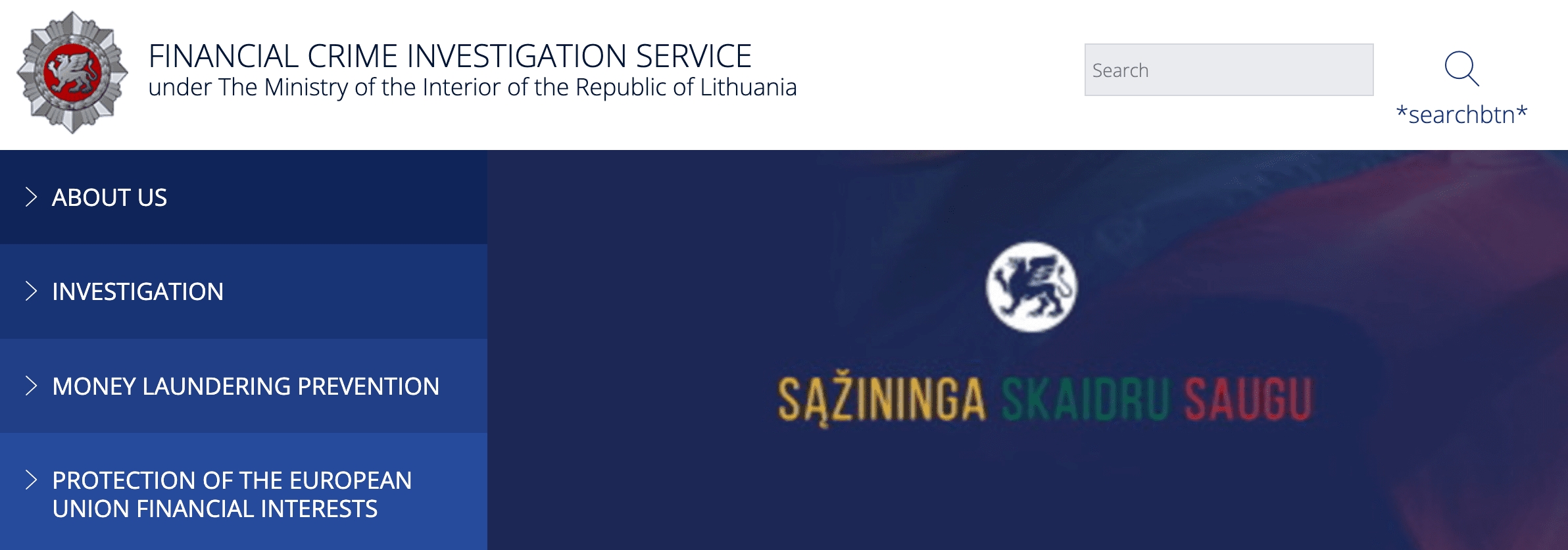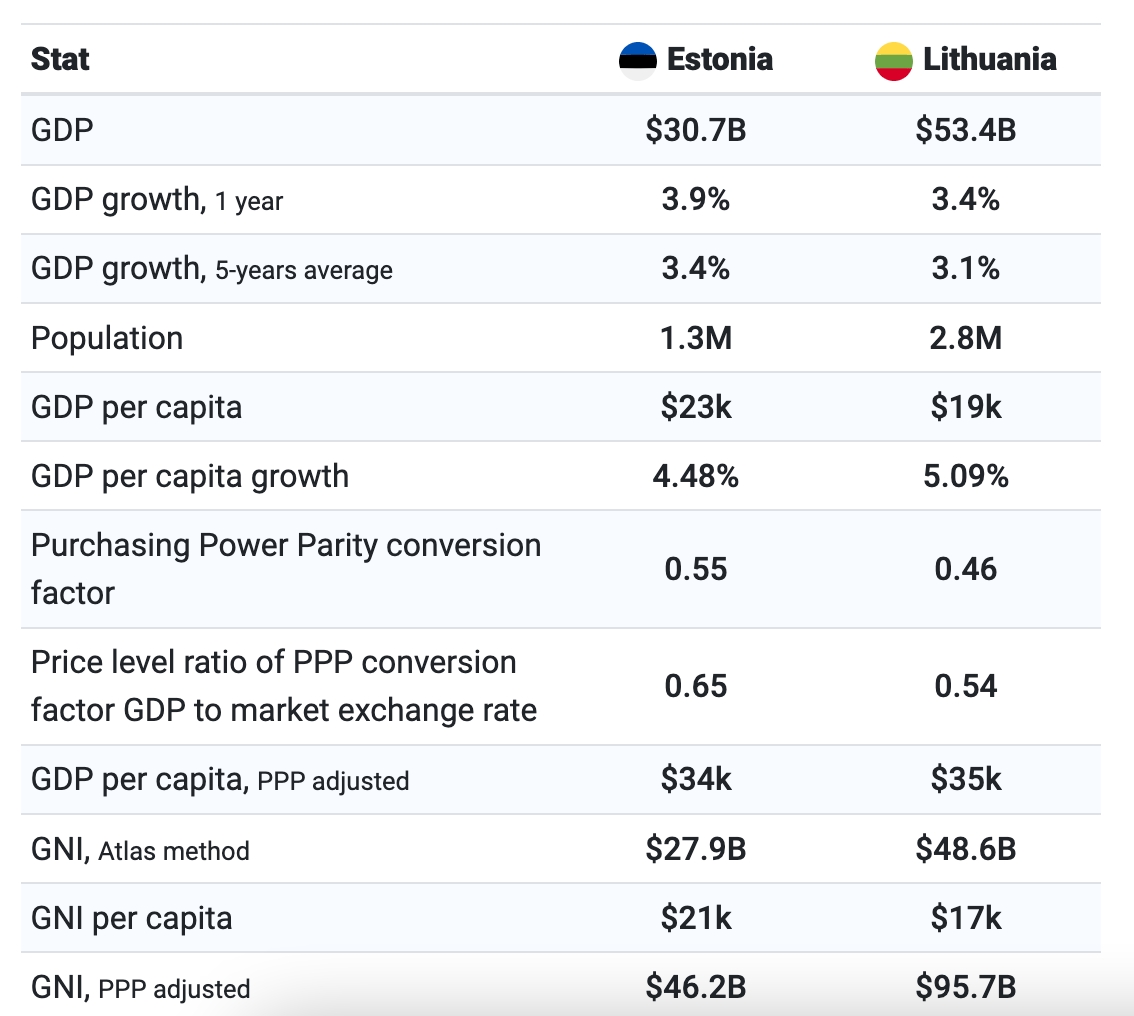Disclaimer: The Industry Talk section features insights by crypto industry players and is not a part of the editorial content of Cryptonews.com.
Crypto regulation can be challenging to navigate, especially given the ever-changing nature of the market. Countries worldwide put their own measures in place to prevent issues related to money laundering and terrorism financing, yet they must still strike a balance between creating a safe environment and promoting innovation.
Lithuania is the most recent country to change its regulatory approach, which has been viewed with trepidation by many. However, although these new rules and guidelines present some hurdles, they ultimately help foster a better working environment for all.
With that in mind, this article will take an in-depth look at the crypto regulation changes coming into place in Lithuania before comparing the situation to that of Estonia. We'll also explore how crypto firms can navigate this new regulatory landscape before diving into the benefits of choosing Lithuania as a base of operations.
Crypto Regulation in Lithuania – What You Need to Know
Understanding cryptocurrency regulation is a challenging endeavour – even for those experienced in virtual asset law. So, to ensure readers can appreciate the upcoming changes to Lithuania's crypto regulation, we'll first provide an overview of the current authorization requirements before highlighting how these will be updated in the months ahead.
An Overview of Lithuanian Crypto Regulation
Lithuania has developed a strong reputation over the past few years concerning its approach to crypto market innovation. Financial transactions using cryptocurrency are entirely legal in Lithuania, and the requirements to set up a business have traditionally been relatively simple, making the country an appealing prospect to crypto-focused business owners.
Those looking to work with virtual currency in Lithuania can obtain two different types of registrations (authorizations) by providing mandatory notification to the Register of Legal Entities:
- Cryptocurrency Exchange Authorization
- Crypto Wallet and Custodian Services Authorization
It should be noted that the authorized activities of Cryptocurrency Exchange and Crypto Wallet and Custodian Services are supervised by the Financial Crime Investigation Service (FCIS) in the context of the prevention of money laundering and/or terrorist financing.
The first type of authorization allows the company that holds it to exchange FIAT currency into cryptocurrency and vice versa. This authorization also allows the company to exchange crypto into crypto, opening up a pathway to becoming a fully-fledged cryptocurrency exchange.
The second type of authorization allows the company to set up a digital crypto wallet for clients and store their cryptocurrency. The authorization also allows the company to generate encrypted private keys.

To obtain these authorizations, a company must register as a Virtual Asset Service Provider (VASP), which requires specific requirements to be met. Until recently, these requirements have been considered 'favourable' by crypto-focused business owners – leading to an uptick in companies basing themselves in Lithuania.
Combine this with Lithuania’s low level of corporate tax, set at just 15%, and it’s clear why the country has become a hotbed for innovation in regards to decentralized finance (DeFi) and NFTs.
‘Favourable’ Regulatory Requirements for Lithuania-based Companies
When a company registers as a VASP, the FCIS, as the supervising authority, will require specific standards to be met. These standards are put in place to combat money laundering and terrorism financing, which are issues that have plagued the crypto market since its inception.
Countries worldwide have struggled to balance creating a safe environment and allowing companies to innovate and thrive. However, Lithuania's government opted to establish a law titled the 'Law on the Prevention of Money Laundering and Terrorist Financing', which sought to aid both of these areas.

Under this law, Lithuania’s guidelines have been tailored so that it is relatively simple to set up a crypto-related business in the country, relative to certain other regions. Detailed below are some of the key requirements to operate as a VASP company at the time of writing:
- Establish a limited liability company (UAB) with at least €2,500 in share capital and a minimum of one shareholder and one director
- Have a Money Laundering Reporting Officer (MLRO) with a solid reputation and that is officially employed by the company
- The company must report to the FCIS
- The company must keep records and customer data
- The company must have a local address for government correspondence (it can be a virtual office)
In addition to these requirements, the applicant(s) must provide various documents to apply for a VASP authorization. These include:
- AML/CTF policies and procedures
- Notification of appointed MLRO
These are the rules in place at the time of writing, yet will soon be changed – more on this later in the article. However, the critical thing to be aware of here is that, under the guidelines that have been used over the past few years, those looking to start a crypto business in Lithuania could do so remotely.
This is one of the key reasons why Lithuania has become an appealing destination for crypto firms, as non-residents only require the help of a Trustee based in the country. There are no requirements for the company’s directors or owners to reside in Lithuania.
New Crypto Regulation in Lithuania
The rules and guidelines set out in the ‘Law on the Prevention of Money Laundering and Terrorist Financing’ have been well received until this point. However, as the rate of technological change has increased, new ways of money laundering and terrorist financing have emerged, which has made it more challenging for Lithuania’s regulators to maintain a safe environment.
As such, the decision was made to alter the current regulatory requirements to promote greater transparency in the sector and help prevent illegal activities. This decision was not taken lightly, as stricter rules will naturally make it more difficult for companies to be set up and operate in the country.
Here are the key changes to be aware of:
- Anonymous client accounts or accounts with fictitious names will be banned (effective from November 1st 2022)
- Beneficial owners and members of management are subject to higher standards of good repute (effective from November 1st 2022)
- Companies must have a senior manager who is a permanent resident in Lithuania (effective from November 1st 2022)
- Senior employee can only work exclusively with one VASP company - the exception applies where companies belong to the same group (effective from November 1st 2022)
- Requirement to conduct activities in Lithuania (effective from November 1st 2022)
- The company which form is private limited liability company (UAB) or public limited liability company (AB) must have at least €125,000 in share capital (effective from November 1st 2022 for new VASP entrants; from December 31st 2022 for existing VASP companies will need to increase share capital until 31 December 2022)
- The occasional transaction threshold for customer identification has been lowered to €700; previously, it was €1,000 (effective from January 1st 2023)
- A public list of virtual currency exchange operators and/or depositary virtual currency wallet operators will be established (effective from February 1st 2023)
It's clear that these changes are wide-reaching and will make the process of operating as a crypto-focused company in Lithuania more challenging. The main reason for this is that, once these requirements come into play, companies will have significantly higher expenses in terms of staffing, offices, and risk management.
However, as we'll explore later in this article, these changes don't mark the end of Lithuania's appeal – but may actually promote further growth. These changes have been implemented to ensure Lithuania doesn't become the 'Wild West' of the crypto scene, which ensure the country remains a viable option for serious applicants.
Moreover, it's fair to say that Lithuania's government simply doesn't have the necessary resources to police the crypto market to the level it'd like. Monitoring crypto market activities is expensive due to the advanced blockchain technology and expertise involved, and although Lithuania's lawmakers have clamped down by updating the regulatory requirements, there remains the question of how these will be enforced on a larger scale.
Estonia & Crypto – A Chequered History
Lithuania isn't the only country that has made regulatory changes recently. Fellow Baltic country Estonia has also adopted a 'stricter' approach to crypto regulation - with many Lithuanians fearing that what happened in Estonia may also occur in their home country.
For those unaware, Estonia was one of the first countries to really open its doors to crypto-focused companies. This was achieved through ‘liberal’ regulatory policies, which made it quick and easy for companies to get set up as a Virtual Asset Service Provider (VASP).

The regulation was so relaxed that, by mid-2021, Estonia was home to over 50% of the world's VASPs – a remarkable feat for a country with a population of just over 1.3 million. However, as the crypto market expanded, it became evident that the 'quality' of the companies in operation was becoming an issue, leading regulators to take action.
As noted earlier, regulators must strike a balance between creating a safe environment and permitting innovation – and many believe that Estonian lawmakers focused too much on the former. Drastic regulatory changes came into effect in June 2022 that clamped down on crypto firms, meaning they now must meet strict transparency requirements.
Anonymous accounts are no longer permitted, whilst companies must now have a share capital of at least €250,000 – presenting a significant barrier to entry for new entities. Not only do these rules make launching a crypto firm much harder, but they also add enormous expenses for established firms, leading to many having to shut down.

The implementation of these rules has already caused ripples throughout the crypto sector. Since first emerging as a pro-crypto nation, Estonia has issued approximately 4,000 licenses that allow entities to offer crypto-related services. Now that stricter requirements have come into play, only around 300 of these licenses remain – the rest have been revoked.
The fallout from these regulatory changes has been overwhelmingly negative, with many industry participants believing companies will now look to 'friendlier' countries to base their operations. There's no doubt that regulation is required, yet it's the intensity of the guidelines that has left a bad taste in the mouth.
Differences between Lithuania and Estonia
Given the situation in Estonia, it's clear why pro-crypto Lithuanians are worried about the upcoming policy changes. Estonia's decision to clamp down has halted progress in the sector – and the worry is that a similar scenario could play out in Lithuania.
However, comparing Estonia and Lithuania's situation would be a gross oversimplification. Although the two countries have made significant changes, there are some crucial differences – most of which make Lithuania the more favourable choice for crypto-focused businesses.
Let’s take a look at a few of the most notable differences between the nations:
Number of Companies in Operation
As mentioned in the previous section, Estonia used to be a hotbed for crypto firms, yet the increased regulatory requirements have forced many to shut up shop. Moreover, prospective business owners are likely to look elsewhere when searching for a country to base their firm – which is why over 90% of Estonia’s crypto licenses are no longer valid.

However, the trend in Lithuania appears to contrast with that of Estonia. When Estonian regulators opted to tighten requirements, it naturally made nearby countries (e.g. Lithuania) a better option. Furthermore, given Lithuania's relatively ‘liberal’ conditions, this was likely a no-brainer for most.
To put this into perspective, only eight crypto companies were registered in Lithuania during the whole of 2020. This figure increased to 188 in 2021, whilst 40 more were added in the early stages of 2022. According to the Lithuanian Finance Ministry, more than 250 crypto companies are now based in the country.
Favourable Economic Conditions
Another reason the situation in Lithuania differs from that in Estonia is the different economies each country has. Lithuania has traditionally been seen as a country with a strong and stable economy. According to Georank, Lithuania has the 83rd largest economy globally, with a GDP of roughly $53.4bn.
On the other hand, Estonia’s economy is the 102nd largest in the world, with a GDP of only $30.7bn – roughly 42% smaller than Lithuania's. Lithuania's population is also more than double that of Estonia, and although the former has a lower GDP per capita, Lithuania’s GDP per capita growth rate is significantly higher.

Another vital factor to bear in mind is tax, which is where the countries really differ. The tax rate on a cryptocurrency company’s profits is just 15%, whilst it is set at 20% in Estonia. What’s more, a ‘micro company’ may even qualify to be taxed at a rate of between 0% and 5% in Lithuania if certain conditions are met.
Finally, inflation is significantly higher in Estonia than in Lithuania, regardless of whether it's measured using consumer prices or a GDP deflator. These characteristics combine to paint a rosy picture of Lithuania's economy compared to Estonia's. Naturally, this makes Lithuania a better option for business owners looking for somewhere to base their crypto firm.
Regulatory Resources
Finally, Lithuania and Estonia differ concerning regulatory capabilities. Although updated regulation coming into play does increase the requirements for new and established firms, these rules must still be enforced properly.
As mentioned earlier, Lithuania’s resources in this regard are currently lacking. The Financial Crimes Investigation Service (FCIS) works under the Ministry of the Interior to investigate companies suspected of money laundering or terrorist financing. However, the measures this body can take are relatively limited.
For example, the FCIS primarily develops public communication strategies to engage people in the battle against financial crime and helps identify and prevent criminal financial acts. Yet the FCIS doesn't have the capacity to actually charge the wrongdoers – it simply conducts investigations and hands the information over to the courts.
In addition, the rate of technological innovation in the crypto market has made it challenging for regulators in Lithuania to keep up. Resources are limited in this regard, so many believe that, even though new rules are coming into play, the actual consequences of these rules may not be as severe as initially thought.

In contrast, Estonian regulators have taken a hard-line stance and are unafraid to crack down on new and established firms that aren't abiding by regulatory guidelines. The Estonian Financial Intelligence Unit (FIU) has already revoked hundreds of crypto licenses from firms that have refused (or been unable) to comply with the new rules.
What’s more, those found to be avoiding regulation can be fined up to 300 units; if they commit the same offence again, the fine can reach up to €400,000. There’s even scope for short-term custodial sentences to be dished out in severe cases.
So, putting everything together, it's clear that Estonia's uncompromising approach is much different from the current process in Lithuania. Although this could change in the future, as it stands, Lithuania still appears the more ‘relaxed’ option for cryptocurrency firms.
New Working Conditions – How Can Crypto Companies Stay Compliant?
The new guidelines set out earlier in this article for Lithuania-based companies may appear strict at first glance, yet there are ways they can be navigated that won’t cause major strife. Although rules like the increased share capital requirement cannot be avoided, some aspects of the updated regulation should be relatively simple to abide by:
- Ensure that all of the management team and owners do not have a criminal record
- Maintain one senior manager who permanently resides in Lithuania.
- Have at least €125,000 in share capital. Importantly, no specific ‘methods’ of share capital contribution are required, meaning that non-monetary contributions may be accepted (e.g. virtual currencies, intellectual rights).
- Ensure the company is providing some services within Lithuania and to Lithuanian customers.
- Make sure the company is publicly registered so that specific information, such as the company’s office address and email address, is available in the State Enterprise Centre of Registers.
Existing companies must comply with the new requirement on the share capital by December 31st 2022. Those who do not meet this requirement will be de-registered from the Register of Legal Entities.
A final point to note is that the Financial Action Task Force (FATF) has recommended extending the 'Travel Rule' to include VASPs. This regulation will not come into play until 2025 but will significantly increase the data required from crypto transactions.
When the Travel Rule does come into play, VASPs will be required to do the following to remain compliant:
- The VASP performing the service will require the originator’s name, account number, address, personal document number, customer ID number, and place of birth.
- The VASP performing the service will require the beneficiary's name and account number.
Given that there are several years until this Travel Rule is implemented, there is a high chance that the requirements may change in the interim. As such, although Lithuanian crypto companies should bear this in mind, it’s not worth focusing too much on at present.
Is Lithuania Still the ‘Go-To’ for Crypto Companies?
Until this point, we've touched on Lithuania's new regulation, how it compares to the situation in Estonia, and how crypto companies can remain compliant. But putting all of this information together, can Lithuania still be considered one of the best jurisdictions for crypto-focused projects?
In many ways, it can be. To expand on this further, detailed below are two key reasons why Lithuania is still an excellent option for those operating within the crypto market:
Easy Client Identification
Onboarding is a crucial part of any cryptocurrency project – whether for the owner(s) or the clients themselves. When a client wishes to sign-up to buy, sell, or trade crypto, it's natural that they want the process to be as quick and streamlined as possible.

Thankfully, Lithuania's guidelines for customer verification remain relatively simple, which is excellent news for clients and the crypto firm itself. Clients will be asked to prove their identity, which can be done via theirIdentity Document (e.g. Identity Card) or Lithuanian Residence Permit.
Interestingly, clients don’t have to be residents of Lithuania. As such, they can prove their identity simply by providing an identity document from a foreign country or even a driving license issued by a country within the European Economic Area (EEA).
No Need for Physical Documents
Moreover, the identification documents don't have to be physically presented – a scanned copy or a photo will suffice. This dramatically speeds up the onboarding process and prevents headaches for all parties, making Lithuania-based platforms more appealing than those in certain other countries.
To put this into perspective, the Estonian onboarding procedure requires a qualified digital signature to ensure the integrity of the supplied information. The Czech Republic is even stricter, as clients can only be onboarded once the first payment is received on the account.
As these elements highlight, Lithuania remains the best option for those looking to get set up quickly and without any complex requirements. Over the long term, this is likely to play a massive role in the growth of Lithuania's crypto sector.
Final Thoughts
To conclude, this article has thoroughly explored Lithuania's new crypto regulation, covering how the rules are set to change and what this will mean for new and established firms. We've also compared Lithuania's situation to that of Estonia, highlighting the key differences between the two.
Overall, there's no doubt that Lithuania's new rules will somewhat stifle crypto firms' growth. However, digging into the details a little more, it becomes apparent that the new regulations aren't as severe as those in other countries. Due to this, there's a growing consensus that Lithuania's crypto sector could still prosper in the years ahead.
 cryptonews.com
cryptonews.com